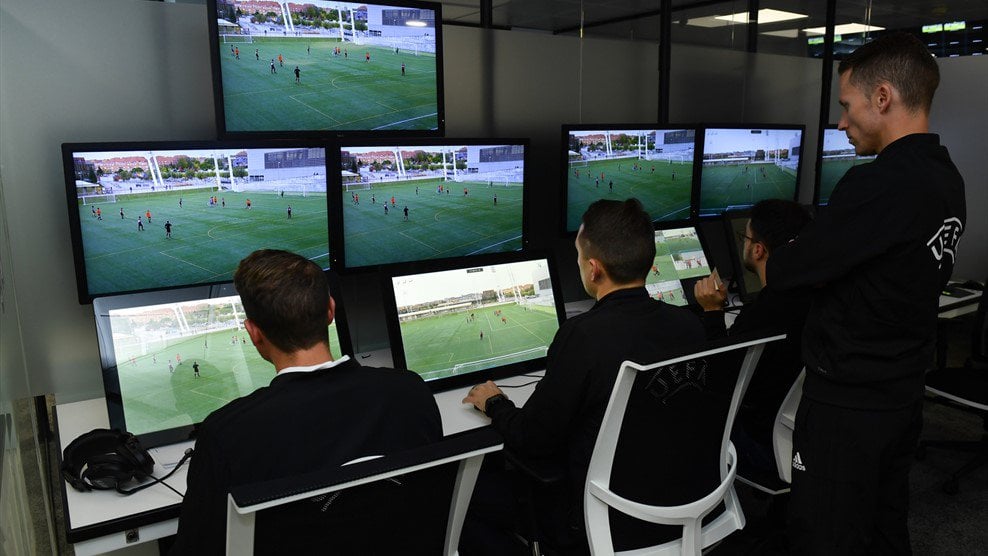“In football, the result is an impostor. You can do things really, really well but not win.”
These words from the famous former Barcelona and Spain football player Xavi Hernandez illustrate how the use of certain types of technology is nowadays intertwined with football. With both EURO 2020 and the Copa America in its final stages during this week, football has recently yet again cemented itself as one of the most popular global sports.
Now, more and more football clubs and football federations are applying football analytics, technology and statistics to see which players are the best-performing ones on the field – and it is not always about the number of goals that are scored. So, what is football analytics and why is it useful?
Data can be of great aid to football clubs
Ubitrack, a football performance data company, founded in Bulgaria in 2019, uses automated data extraction technologies and solutions to aid football clubs in their pursuit of finding the best performing players. Based on that data analytics, football clubs can assess their teams’ performance, identify areas to improve, and also analyze the competition.
The company’s software extracts millions of raw data entries from each match with high-accuracy, thanks to using Computer Vision and Machine Learning algorithms. In practice, the company installs cameras around a football pitch, which then extracts performance data about football teams and their players. By using these methods, the software acquires millions of data entries, which are then processed and delivered to the final customer.

“It is already evident that technologies can help improve the performance of regional teams. In recent years we see how teams like Ludogorets and CSKA1948 are investing in tracking and analytics tech. These teams have been performing very well in the past few years. Performance information is a tool which can validate the team`s approach,” Ubitrack’s CEO and co-founder Nikolay Tashev tells The Recursive.
For example, if a football coach wants his players to improve physically, his assistant coaches create an exercise regimen. The performance information will then validate if the regimen is effective or if there should be an adjustment. This type of football analytics can save time, money and result in a better position in the league, Tashev explains.
“Having information about the opposite team allows coaches to prepare stronger opposition to their opponents. That way there is a bigger competition which is more entertaining to the fans. That may even lead to clubs performing better in European competitions,” Tashev adds.
How football analytics can help smaller Balkan clubs make smarter investments
Then, there are also the actual scouts who collect football performance data from matches. Skopje-born 28-year-old Vlatko Jakimovski is working as a football data scout in North Macedonia. For Jakimovski, data and statistics are often much more reliable than football results themselves, when clubs are in search of the best players.

“Data scouting and football statistics are used a lot because it helps those who are working in the sport. Football is a sport where coincidences and luck have the biggest effect because most of the time there are very few goals,” Jakimovski tells The Recursive.
“There are many variables that influence who will win a football match, and the best team doesn’t always necessarily win,” Jakimovski adds.
According to him, the data that is gathered with this method is used for a realistic representation of the football forces on the field, regardless of the result.
“As scouts, we have to be physically present at the matches, because every chance to score a goal in the match is different, and for example, it might be very much difficult to differentiate if one team has 10 weak shots on goal or three strong shots on goal, and that there is a difference according to the intensity of these chances,” he explains.
The statistics also provide an observation on what is happening on the field, and where new methods are used to discover which team is better.
These methods could in particular come in handy for the Balkan countries, where football isn’t as developed as in Western Europe, and where the investments in the game are at a significantly lower level.
“Companies need to find real scouts who will not be biased about some of the teams and staff that will take control of the whole process. I think that with smart and proper investment, the Balkan countries can become successful. Because when it comes to their finances, unfortunately, they cannot compete with football clubs from Western European countries, whose teams are financially far more powerful,” Jakimovski tells The Recursive.
The growth of startups and sports tech companies will also bring much of these services closer to the region, Tashev agrees.
“Technology, in essence, automates and improves processes. Because of that, the recent growth in sports tech companies and particular start-ups will bring all these products and services to markets that presently cannot afford what the market incumbents offer. Regions like the Balkans are now able to afford world-class tools and improve drastically in the coming years.” Tashev tells The Recursive.
VAR – does it really make the game fairer?
During the past year, and also recently seen at the EURO 2020, the Video Assistant Referee (VAR) technology has become even more prominent than the actual referees on the field. The VAR system, which consists of officials stationed in a video operation room, reviews dubious decisions made by the actual referee on the field, using video footage, offside line technology, and different graphics.

While it does make the game fairer in a way, by reviewing every suspicious call that the referee has made, for many fans, even this system has its faults, and sometimes “takes the joy out of the game”.
Nikola Zdravkovic, a prominent sports journalist from Skopje, says that when he first saw how the VAR system was enacted in some football games, he also saw the possibility of the system’s inconsistency.
“Like everything that modern existence brings nowadays, VAR has its pros and cons. Speaking of the benefits of it, it must be noted that dubious goals, (non)existent goals, and even dirty moves that players make can be avoided when they think that someone will be watching them during the game. So this is what should dominate the VAR consultations”, Zdravkovic tells The Recursive.
“But in practice, this does not seem to be the case. One of the many remarks is that it destroys the game, in the sense that until a certain decision is checked by VAR, a person can not normally rejoice, so he is therefore waiting to see what the final decision will be. And this goes for players of both teams, but the fans as well”, Zdravkovic adds.
However, the technology itself can make the wrong call, as many football analysts have noted.
“Even in the Premier League, we had cases where analysts disputed decisions made after consultation with VAR, especially in those millimeter offsides with a player’s nose, the tip of a shoe, little finger, etc.”, Zdravkovic points out.
Perhaps the most important moment in the referee-VAR relationship, which ultimately affects all direct and indirect participants in a match, is that some of the referees could become over-reliant on VAR, and could start interrupting the game even when there’s no need for it.
According to Zdravkovic, at the moment it is very difficult to have a final say on whether VAR is good or bad for football, especially when both camps “for” and “against” the implementation of this technology, have their valid arguments.
“What we have to admit is that VAR serves to get a fair game, but those who are its fierce supporters must also be fair and admit that there is still work to be done in this field”, he concluded.
+++Read about other sports tech startups from Southeast Europe.








